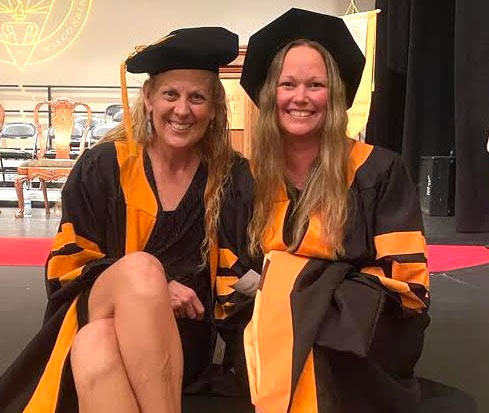Wisconsin Nurse Educator Program Celebrates Inaugural Graduates.
The Wisconsin Nurse Educator Program, (WNEP) has graduated its first class in the WNEP curriculum. Two of these many graduates are Amy Broihahan, DNP, RN, PCCN, CNE. And Nikki Lamberty, DNP, RN CNE.
WNEP students are provided the opportunity to refine their teaching skills and knowledge to prepare future nurses and enhance their professional and personal growth.
They look forward to shaping nursing education and addressing the nursing workforce needs in Wisconsin.
WNEP is an initiative by the Administrators of Nursing Education in Wisconsin (ANEW) and the Wisconsin Nurses Association (WNA) to support the education of nurses in Wisconsin. The state has approved funds to offset the expenses of nurses enrolled full-time in PhD, DNP or master’s Nurse Educator programs as well as post-doctoral fellowships by providing funds and opportunities to Wisconsin students.

Amy Broihahan, (left) DNP, RN, PCCN, CNE.
Nikki Lamberty, (right) DNP, RN, CNE
To continue supporting the education of nurses in Wisconsin, the state has approved a second wave of $10 million to the Wisconsin Nurse Educator Program Phase 2 (WNEP2) in the 2023-2025 budget. It is an exciting and rare opportunity for anyone who has considered becoming a nurse educator.
These dollars will fund nurses pursuing a Master of Science in Nursing (MSN)-Nurse Educator, Doctor of Nursing Practice (DNP) or PhD degree, as well as post-doctoral fellowships. Recipients are required to teach for three years in a Wisconsin nursing program following their graduation. Faculty loan forgiveness—including faculty coming from out of state—is also available for qualified candidates who apply and are hired at a Wisconsin nursing program.
PhD students are eligible for up to $50,000, DNP students $40,000 and MSN NE students $30,000. The awards are discreet amounts, not variable. Funds may be used to cover the cost of tuition as well as expenses related to school such as books, travel, childcare, etc. Students must maintain full-time enrollment and must commit to teaching at an approved Wisconsin-based school for at least three years post-graduation.
The funds are distributed through the Wisconsin Higher Educational Aids Board (HEAB). Application forms are available on the HEAB website. Applications will be reviewed and approved on a first-come, first-served basis. Applications will be received until all funds are distributed. Funds will be dispersed in the fall and spring semesters of the academic year. Applicants are responsible for budgeting use of funds to extend throughout the program of study.
